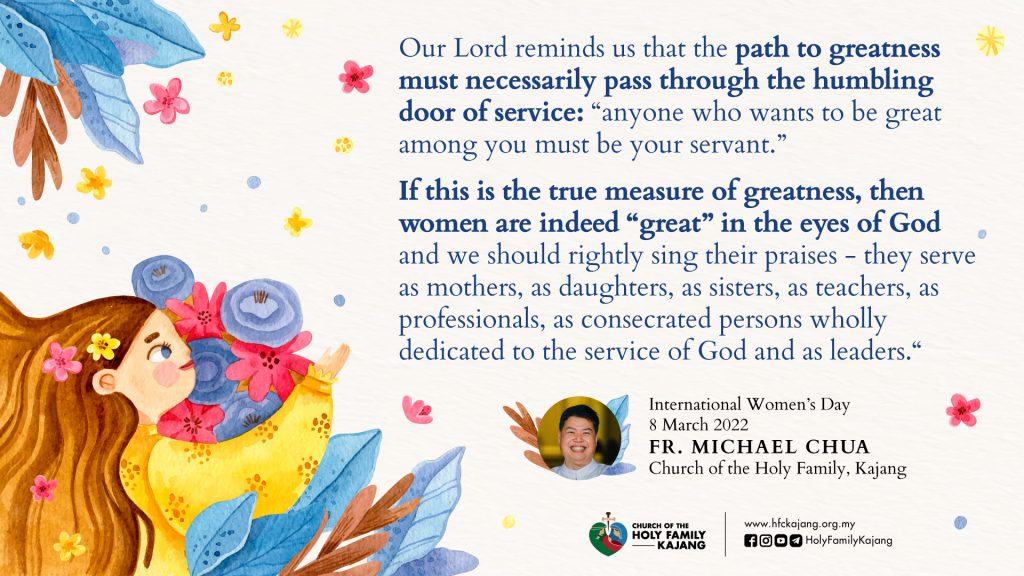
Message by Rev. Fr. Michael Chua
Parish Priest
Church of the Holy Family, Kajang
Today, the world celebrates International Women’s Day to recognise both the achievements as well as the struggles of women in societies throughout the world. But for us Catholics, the original Women’s Day should be the 25th of March, the Solemnity of the Annunciation, the day a human woman became the Mother of God. Can there be any greater honour or distinguished title accorded to a human person?
It must remembered that the greatness of Mary comes not from her rejecting life, as many would argue is the sine qua non of empowered womanhood. Rather, her greatness and empowered femininity spring from her willingness to accept life. She freely chose life not autonomy. She freely chose God not her own dreams. Her obedience to God’s will did not diminish her status. On the contrary, her obedience raised her to a rank above all mortals, both men and women. The exalted status of our Blessed Mother reminds us that equality can never mean dragging everyone down to the same pedestrian level. It means being raised up to the exalted heights of our human dignity which God had intended for each one of us.
St Paul’s statement that “there is neither Jew nor Gentile, neither slave nor free, nor is there male and female, for you are all one in Christ Jesus” (Gal 3:28), finds resonance in contemporary society as it strikes an almost modern note about human equality. It does seem to envisage a utopian and cosmopolitan society that is no longer divided or polarised by distinctive ethnicities, social status or gender.
But St Paul was not making a scientific statement, nor a political statement, nor an anthropological statement. He was merely stating a theological truth - that all men and women had equal dignity before God despite differences in biology and roles because all men and women are created by God, all men and women share in the gift of the divine exchange through the Incarnation of the Word, and God has intended the salvation of all men and women, without distinction, without discrimination, and without prejudice. That is at the heart of our Christian understanding of equality.
If we wish to truly stand with God on the side of equality, we must resist the temptation to give in to contemporary trends that are constantly shifting. Ultimately, equality must be judged by the standards set by God and not subject to the demands of an inhuman understanding of the world that flattens some distinctions while exaggerating others, and disrupts basic institutions like the family, in order to do so. Such form of “equality” which does not serve the highest good which is God, will result in the most unjust inequality - where distinctive cultural and social norms and even sexual roles are obliterated in the name of the false god of equality.
Our Lord reminds us that the path to greatness must necessarily pass through the humbling door of service: “anyone who wants to be great among you must be your servant.” If this is the true measure of greatness, then women are indeed “great” in the eyes of God and we should rightly sing their praises - they serve as mothers, as daughters, as sisters, as teachers, as professionals, as consecrated persons wholly dedicated to the service of God and as leaders. But it is Mary whom we look to for an example par excellence of womanhood. For she alone “among all women” could boast of a son who is God. And it is she who reveals to us the true source of a person’s blessedness and greatness in her song, the Magnificat:
“He looks on his servant in her lowliness; henceforth all ages will call me blessed.”
So, if we choose to honour women today, let us not forget to honour God, for He is the source of all that is good and great and honourable in man and women of goodwill.